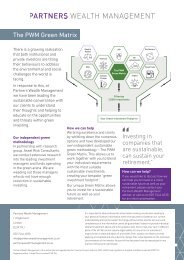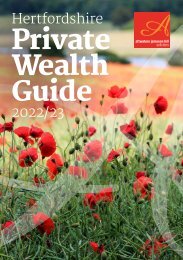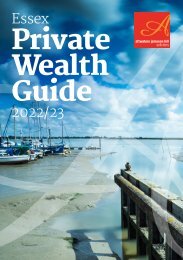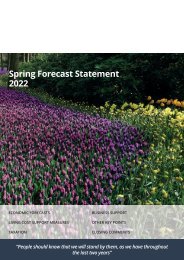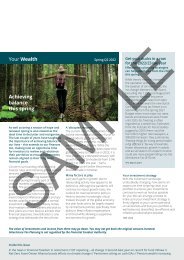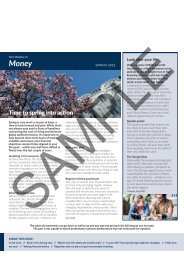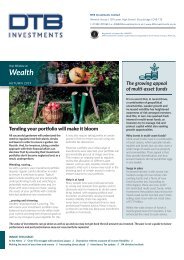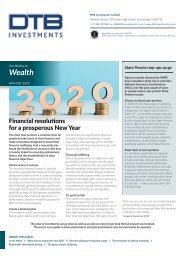Susan Hill FP - Magazine Issue 23 Winter Q1 2023
You also want an ePaper? Increase the reach of your titles
YUMPU automatically turns print PDFs into web optimized ePapers that Google loves.
Suite 102,<br />
54-56 Victoria Street,<br />
St Albans,<br />
AL1 3HZ<br />
Freephone 0808 1<strong>23</strong> <strong>23</strong>32<br />
info@susanhillfp.co.uk<br />
www.susanhillfp.co.uk<br />
<strong>Issue</strong> <strong>23</strong> | <strong>Winter</strong> 20<strong>23</strong><br />
Inside this issue:<br />
Your investment focus for 20<strong>23</strong><br />
Saving for their future<br />
Global growth<br />
Beat the tax chill<br />
Estate planning – take control
Contents<br />
Your investment focus for 20<strong>23</strong> 02<br />
Reminder – tax year end 03<br />
In the news 04<br />
Global growth 04<br />
Dividend news 04<br />
Saving for their future 05<br />
Beat the tax chill 06<br />
Estate planning – take control 07<br />
Retirement reboot 07<br />
In other news 08<br />
Your investment<br />
focus for 20<strong>23</strong><br />
Family finances: get talking 08<br />
‘Magic’ scam warning 09<br />
Improve your wellbeing 10<br />
Resolution – review<br />
and rebalance 10<br />
New year – check<br />
your protection 11<br />
Building retirement<br />
resilience in 20<strong>23</strong> 12<br />
By any comparison, the past<br />
12 months have been tough for<br />
investors with a series of shocks<br />
impacting markets and, as 20<strong>23</strong><br />
dawns, uncertainties remain. One<br />
constant on the investment horizon,<br />
though, is the requirement to be<br />
strategic with your portfolio. A<br />
sound strategy based on careful<br />
planning; making purposeful<br />
decisions, based on thorough<br />
research and reliable processes,<br />
will stand you in good stead.<br />
Last year saw markets struggle with<br />
bouts of volatility as a combination of<br />
high inflation, rising interest rates and the<br />
war in Ukraine brought about challenging<br />
headwinds and markets sought a stable<br />
footing. As a result, fund inflows slowed<br />
while cash as a percentage of investors’<br />
portfolios rose, prompting warnings that<br />
investors need to be aware of limitations<br />
to the Financial Services Compensation<br />
Scheme (FSCS) for cash balances.<br />
Identifying opportunities<br />
With large amounts of money on the<br />
sidelines, using our knowledge, we aim<br />
to identify opportunities and position<br />
portfolios to benefit from recessionresistant<br />
companies in which we have<br />
conviction. Those who still have the<br />
capacity to invest should consider adding<br />
back to their portfolios in order to take<br />
advantage of any potential low valuations.<br />
The value of investments and income from them may go down. You may not get back the original amount invested. A pension is a<br />
long-term investment. The fund value may fluctuate and can go down. Your eventual income may depend on the size of the fund at<br />
retirement, future interest rates and tax legislation.<br />
2 Money & Wealth | <strong>Issue</strong> <strong>23</strong> | <strong>Winter</strong> 20<strong>23</strong>
Battling inflation<br />
Investors also need to be aware of the<br />
erosive impact of inflation on cash-based<br />
savings. In the current economic climate,<br />
anyone holding a significant proportion<br />
of their assets in cash, even with savings<br />
rates improving, will inevitably see the<br />
value of their wealth decline in real terms.<br />
In essence, equities offer a better potential<br />
defence in the battle with inflation.<br />
Trust in our process<br />
Experienced investor or not, staying calm<br />
during periods of market turmoil is never<br />
easy but adapting your mindset and<br />
focusing on investment strategy rather<br />
than market sentiment is vital. Investing<br />
in the stock market does clearly involve a<br />
level of risk but the adoption of a carefully<br />
considered strategy based on sound<br />
financial planning principles undoubtedly<br />
offers investors the best chance of success.<br />
A sound strategy based on<br />
careful planning; making<br />
purposeful decisions, based<br />
on thorough research and<br />
reliable processes, will<br />
stand you in good stead<br />
Reminder – tax year end<br />
As the end of the tax<br />
year approaches, a prime<br />
consideration should be<br />
how external factors such as<br />
reduced or frozen allowances,<br />
together with high inflation,<br />
could impact your finances and<br />
what action you need to take<br />
before 5 April 20<strong>23</strong>.<br />
If you are affected by the<br />
impending changes to Dividend<br />
Tax or Capital Gains Tax (CGT)<br />
announced in the Autumn<br />
Statement, have you considered<br />
investing up to £20,000 this<br />
tax year in a stocks and shares<br />
Individual Savings Account (ISA)?<br />
From April 20<strong>23</strong>, the Dividend<br />
Allowance will be cut from £2,000<br />
to £1,000 and then fall further to<br />
£500 from April 2024. In addition,<br />
the annual CGT exemption will<br />
fall from £12,300 to £6,000 next<br />
tax year and then to £3,000 the<br />
following tax year. Dividends<br />
received on shares within an ISA<br />
are tax free and won’t impact<br />
your Dividend Allowance. Also,<br />
any profit you make when selling<br />
investments in your stocks and<br />
shares ISA is free of CGT.<br />
And don’t forget your pension<br />
Both the Annual Allowance and<br />
Lifetime Allowance are frozen,<br />
at £40,000 and £1,073,100<br />
respectively. As these allowances<br />
haven’t increased with inflation, it<br />
effectively means those saving to<br />
the maximum extent possible with<br />
tax concessions can save less in<br />
real terms each year.<br />
The value of investments and income from them may go down. You may not get back the original amount invested. A pension is a<br />
long-term investment. The fund value may fluctuate and can go down. Your eventual income may depend on the size of the fund at<br />
retirement, future interest rates and tax legislation.<br />
Money & Wealth | <strong>Issue</strong> <strong>23</strong> | <strong>Winter</strong> 20<strong>23</strong> 3
In the news…<br />
Hold your nerve<br />
Recent research 1 reveals women<br />
are more likely to hold their nerve<br />
and avoid crystallising a loss when<br />
the market dips. Almost half of men<br />
(48%) have sold investments at a<br />
loss when they’ve dropped in value,<br />
in an attempt to stem their losses,<br />
while just 38% of women have<br />
done the same. Such impatience<br />
could prove to be costly. The<br />
research estimates (based on<br />
£10,000 invested in 1992, adding<br />
10% of average salary and<br />
reinvesting dividends until 2022)<br />
that the real cost of ‘impatient’<br />
investing over 30 years could<br />
amount to nearly £200,000!<br />
And the best place<br />
to retire is…<br />
Global growth<br />
The International Monetary Fund<br />
(IMF) 3 has predicted a challenging 20<strong>23</strong>,<br />
reducing growth expectations and<br />
forecasting economic contraction in a<br />
third of the world, in its latest World<br />
Economic Outlook entitled ‘Countering<br />
the Cost-of-Living Crisis.’<br />
With the cost-of-living crisis ‘tightening<br />
financial conditions in most regions’, the<br />
outlook suggests that in order to restore<br />
price stability, monetary policy should stay<br />
the course and fiscal policy should aim<br />
to alleviate pressures ‘while maintaining a<br />
sufficiently tight stance.’<br />
The global growth rate for 20<strong>23</strong> has been<br />
revised down from previous expectations<br />
to 2.7%. This reflects ‘significant slowdowns’<br />
for the largest economies as America’s<br />
gross domestic product (GDP) contracted<br />
in the first half of 2022, followed by the<br />
Euro area’s contraction in the second<br />
half of last year, and prolonged COVID-19<br />
outbreaks and lockdowns in China. Closer<br />
to home, the IMF predict growth of 3.6% in<br />
2022 and 0.3% in 20<strong>23</strong> for the UK.<br />
3<br />
IMF, 2022<br />
The global growth rate for<br />
20<strong>23</strong> has been revised down<br />
from previous expectations<br />
to 2.7%<br />
Retiring abroad is a much-desired<br />
goal for many, particularly for an<br />
improved lifestyle. Croatia currently<br />
tops the list of the best countries<br />
to retire in, due to a better cost<br />
of living when compared with the<br />
UK – rent costs and the price of<br />
day-to-day living is nearly half that<br />
versus the UK 2 . Croatia also scores<br />
highly due to the ease of getting<br />
there from the UK, with relatively<br />
cheap average flight costs meaning<br />
that friends and family can visit<br />
and flying back to the UK is also<br />
convenient. (Relocation to some<br />
countries may mean forgoing future<br />
annual increases to State Pension.)<br />
1<br />
Alliance Trust, 2022, 2 Penfold, 2022<br />
Dividend news<br />
According to the latest Dividend Monitor 4 , driven by sterling weakness, 2022<br />
headline payouts are expected to rise to £97.4bn, up 11.0% on an adjusted<br />
basis, with underlying dividends expected to rise 13.4% to £87.2bn. The<br />
provisional forecast for UK dividends in 20<strong>23</strong> anticipates a slight drop in<br />
headline dividends but modest underlying growth.<br />
Looking ahead, Ian Stokes, Managing Director of Corporate Markets UK and<br />
Europe at Link Group commented, “For 20<strong>23</strong>, we expect a further reduction in mining<br />
dividends and likely lower one-off special dividends but outside the mining sector there<br />
is still room for payouts to rise, even with a weakening economy. Our provisional 20<strong>23</strong><br />
forecast suggests a slight drop in headline dividends to £96bn and a slight increase in the<br />
underlying total to £89bn. This implies no change in our expectation that UK payouts will<br />
only regain their pre-pandemic highs some time in 2025.”<br />
4<br />
Link Group, 2022<br />
The value of investments and income from them may go down. You may not get back the original amount invested.<br />
4 Money & Wealth | <strong>Issue</strong> <strong>23</strong> | <strong>Winter</strong> 20<strong>23</strong>
Saving for<br />
their future<br />
Investing on a child’s behalf<br />
can make a huge difference<br />
to their future<br />
With the current generation of<br />
graduates typically leaving university<br />
with a mountain of debt, it is<br />
perhaps unsurprising that so<br />
many parents are now looking to<br />
ease the burden by investing on<br />
their children’s behalf.<br />
University challenge<br />
Government statistics show the average<br />
debt accumulated by a university student<br />
is currently around £45,000. Thankfully,<br />
graduates only start repayments when<br />
their earnings hit a certain threshold and,<br />
at the moment, loans are written off after<br />
30 years however much debt remains.<br />
As a result, some students will never pay<br />
back their loans in full.<br />
Increasing debt burden<br />
Many students, though, do repay all of<br />
their debt, and recent reforms to the loans<br />
system means many more will do so in<br />
the future – government forecasts suggest<br />
that, from next year, over half of students<br />
will repay their loans in full. This inevitably<br />
places an even greater burden on future<br />
graduates’ shoulders, both as they<br />
enter the world of work and, potentially,<br />
throughout their entire careers.<br />
Giving your children a helping hand<br />
Most parents are keen to help their<br />
children fund university and many do<br />
so by investing on their behalf through<br />
a stocks and shares Junior ISA (JISA).<br />
While there are risks with stock market<br />
investments, historically they have<br />
performed better than cash-based savings<br />
and consistently delivered above-inflation<br />
returns. The annual JISA allowance is<br />
currently £9,000 per child which, for<br />
anyone who starts saving early, can grow<br />
to a sizeable tax-free lump sum. Smaller<br />
amounts can mount up too, particularly<br />
when combined with contributions from<br />
other family members.<br />
Peace of mind<br />
Investing on a child’s behalf can make a<br />
huge difference to their future, whether<br />
they decide to go to university or put the<br />
money towards something else. It also<br />
provides parents with the comfort of<br />
knowing they are giving their children the<br />
best possible start to adult life.<br />
The value of investments and income from them may go down. You may not get back the original amount invested.<br />
Money & Wealth | <strong>Issue</strong> <strong>23</strong> | <strong>Winter</strong> 20<strong>23</strong> 5
Beat the<br />
tax chill<br />
Following his controversial<br />
‘stealth tax’ Statement in<br />
November, the Chancellor made<br />
a raft of key personal taxation and<br />
pension announcements.<br />
The government pledged its commitment<br />
to the pensions Triple Lock, which will<br />
increase the State Pension in line with<br />
September’s Consumer Prices Index (CPI)<br />
rate of 10.1%. This means that the value<br />
of the basic State Pension will increase<br />
in April 20<strong>23</strong> from £141.85 per week to<br />
£156.20 per week, while the full new State<br />
Pension will rise from £185.15 to £203.85<br />
per week.<br />
Then came some ‘stealth’ announcements<br />
set to pull people into paying higher rates<br />
of tax, more people paying Inheritance<br />
Tax (IHT), a cut to tax-free earnings from<br />
dividends and a reduction in<br />
CGT allowances.<br />
In addition to the Dividend Allowance<br />
and CGT allowance reductions (as per<br />
‘Tax year end reminder’ article) and IHT<br />
freeze (see page 7), other key personal tax<br />
announcements included:<br />
• The Income Tax additional rate threshold<br />
(ART) at which 45p becomes payable will<br />
be lowered from £150,000 to £125,140<br />
from 6 April 20<strong>23</strong>. The ART for nonsavings<br />
and non-dividend income will<br />
apply to taxpayers in England, Wales and<br />
Northern Ireland. The ART for savings<br />
and dividend income will apply UK-wide.<br />
This move is set to push 250,000 more<br />
people into this band<br />
• The Income Tax Personal Allowance<br />
and higher rate threshold are to<br />
remain at current levels – £12,570<br />
and £50,270 respectively – until April<br />
2028 (rates and thresholds may differ<br />
for taxpayers in parts of the UK where<br />
Income Tax is devolved).<br />
With an increasing number of people likely<br />
to be impacted by these changes, we can’t<br />
stress enough the importance of tax year<br />
end planning. Although some of these<br />
changes don’t come in with immediate<br />
effect, it is vital to ensure you are in the<br />
best place possible to take advantage of<br />
any allowances, exemptions and reliefs<br />
available this year and to prepare for the<br />
changes that come in over the next few<br />
years. With plenty to consider and factor<br />
into your financial plan, valuable financial<br />
advice remains central to achieving your<br />
goals and aspirations.<br />
The value of the basic<br />
State Pension will increase<br />
in April 20<strong>23</strong><br />
The value of investments and income from them may go down. You may not get back the original amount invested. A pension is a<br />
long-term investment. The fund value may fluctuate and can go down. Your eventual income may depend on the size of the fund at<br />
retirement, future interest rates and tax legislation. Inheritance Tax Planning is not regulated by the Financial Conduct Authority.<br />
6 Money & Wealth | <strong>Issue</strong> <strong>23</strong> | <strong>Winter</strong> 20<strong>23</strong>
Estate planning<br />
– take control<br />
Inheritance Tax (IHT) is once again<br />
in the spotlight following the<br />
Chancellor’s decision to freeze IHT<br />
thresholds for a further two years<br />
until April 2028. Extending the frozen<br />
thresholds, together with rising<br />
house prices and soaring inflation<br />
mean that more estates are likely to<br />
be affected.<br />
IHT receipts on an upwards trend<br />
The latest IHT figures released in October<br />
make interesting reading. Total HM<br />
Revenue and Customs (HMRC) receipts<br />
for April 2022 to September 2022 were<br />
£3.5bn, £0.4bn higher than in the same<br />
period last year.<br />
Not just a tax on the very wealthy<br />
IHT is a tax payable on all your assets<br />
when you die and potentially on some<br />
gifts you make during your lifetime. If the<br />
estate is liable for IHT, it is usually payable<br />
at 40%. These days, you don’t have to be<br />
hugely wealthy to be affected by IHT – the<br />
hated tax can cost your estate thousands<br />
of pounds when you die.<br />
A reminder of the thresholds<br />
An individual’s current threshold, or nilrate<br />
band, is £325,000. A couple (married<br />
or civil partners) has £650,000. Any<br />
unused nil-rate band can be passed to the<br />
surviving spouse or civil partner on death.<br />
In 2017 the government introduced an<br />
additional nil-rate band when a residence<br />
is passed on death to a direct descendant.<br />
The main residence nil-rate band is<br />
£175,000 and when added to the existing<br />
threshold of £325,000 could potentially<br />
give an overall allowance for individuals<br />
of £500,000.<br />
To reduce the amount of IHT payable,<br />
many families consider giving assets away<br />
during their lifetime. Some gifts will be<br />
automatically free from IHT; for example,<br />
£3,000 each financial year, certain<br />
wedding gifts and gifts to charities.<br />
Getting the right balance between gifting<br />
money during your lifetime and ensuring<br />
you have enough for your future years<br />
requires careful planning. Expert planning<br />
can legitimately mitigate IHT, meaning<br />
you can pass on assets to your family as<br />
you’d intended.<br />
Retirement reboot?<br />
Nowadays there are more choices<br />
open to you than ever before.<br />
This means there are more things<br />
you need to consider and have a<br />
plan for, like how to manage your<br />
finances to provide the income<br />
you’ll need to live on, how you’ll<br />
transition into full retirement<br />
and what lifestyle you want to<br />
enjoy in your later years.<br />
We’re all leading busy lives and with<br />
cost-of-living financial pressures<br />
intensifying, it’s understandable if<br />
retirement plans have been placed<br />
on the back burner. If you are keen<br />
to revisit your plans and get them<br />
back on track so you can relax and<br />
fully enjoy your retirement years, the<br />
new year is the perfect time to act, so<br />
please do get in touch.<br />
The value of investments and income from them may go down. You may not get back the original amount invested. A pension is a<br />
long-term investment. The fund value may fluctuate and can go down. Your eventual income may depend on the size of the fund at<br />
retirement, future interest rates and tax legislation. Inheritance Tax Planning is not regulated by the Financial Conduct Authority.<br />
Money & Wealth | <strong>Issue</strong> <strong>23</strong> | <strong>Winter</strong> 20<strong>23</strong> 7
In other<br />
news…<br />
On your radar – CTFs<br />
HMRC has reminded teenagers and<br />
people in their twenties to claim<br />
their matured Child Trust Fund (CTF)<br />
savings. CTFs are long-term savings<br />
accounts set up for every child born<br />
between 1 September 2002 and<br />
2 January 2011. The government<br />
provided an initial deposit of at<br />
least £250 to open the account<br />
and encourage future saving. An<br />
estimated 6.3 million CTF accounts<br />
were set up throughout the duration<br />
of the scheme, containing about<br />
£9bn. You can continue to add up to<br />
£9,000 a year to an existing CTF until<br />
age 18. The last CTFs will mature in<br />
2029. To trace a CTF visit www.gov.<br />
uk/child-trust-funds/find-a-childtrust-fund.<br />
Women still<br />
financially less secure<br />
According to a recent government<br />
research paper 5 women are far less<br />
positive about their financial future<br />
than men. Just one in five (20%)<br />
women feel positive, compared to<br />
more than a third (35%) of men,<br />
while only 13% of women are<br />
confident that they have enough<br />
saved towards retirement, compared<br />
to 27% of men. Former Pensions<br />
Minister Baroness Ros Altmann said,<br />
“It’s alarming that… the gender savings<br />
and pension gap remains, and women<br />
are still not confident that they have<br />
saved enough for retirement.”<br />
5<br />
Cushon, 2022<br />
Family finances:<br />
get talking<br />
New research 6 suggests young adults<br />
and their parents are becoming<br />
increasingly comfortable talking<br />
about money matters, which should<br />
ensure future generations are much<br />
better equipped to tackle their<br />
financial affairs.<br />
Breaking the taboo<br />
Historically, intergenerational discussions<br />
about finances have too often been<br />
viewed as a no-go area, but the research<br />
suggests UK families are beginning to<br />
open up, with young adults significantly<br />
more likely to have talked to their parents<br />
about the issue than previous generations.<br />
In total, three out of four 18 to 24-yearolds<br />
said they spoke with their parents<br />
about money matters when they were<br />
growing up; this compares to just four<br />
in ten over-65s and half of 55 to<br />
64-year-olds.<br />
Reaping the rewards<br />
Experts have long advocated the benefits<br />
of families talking openly about financial<br />
affairs. Parents who do so are more<br />
likely to ensure their children are better<br />
prepared to deal with money matters<br />
when they reach adulthood, whether in<br />
relation to day-to-day spending issues<br />
or the need to develop longer-term<br />
savings habits.<br />
Young wealth owners<br />
The need for young adults to be financially<br />
savvy has perhaps never been greater,<br />
with a growing proportion of this<br />
generation now owning a considerable<br />
amount of wealth. Indeed, estimates 7<br />
suggest the number of UK Millennial and<br />
Generation Z millionaires has doubled<br />
over the past year and now stands at a<br />
record high of 2,000.<br />
Keep talking<br />
An increasing desire for families to discuss<br />
financial affairs is definitely a positive trend<br />
which should help the next generation<br />
realise the value of money and establish<br />
good financial habits at a young age. So,<br />
keep the conversations going to help<br />
secure your children’s financial futures.<br />
6<br />
Royal London, 2022, 7 Bowmore, 2022<br />
The value of investments and income from them may go down. You may not get back the original amount invested. A pension is a<br />
long-term investment. The fund value may fluctuate and can go down. Your eventual income may depend on the size of the fund at<br />
retirement, future interest rates and tax legislation. Inheritance Tax Planning is not regulated by the Financial Conduct Authority.<br />
8 Money & Wealth | <strong>Issue</strong> <strong>23</strong> | <strong>Winter</strong> 20<strong>23</strong>
‘Magic’ scam warning<br />
The Financial Conduct Authority<br />
(FCA) has warned pension holders to<br />
beware of scammers’ ‘magic tricks’<br />
as research shows the economic<br />
squeeze is encouraging more people<br />
to withdraw pension savings.<br />
ScamSmart<br />
Britain’s financial watchdog recently<br />
launched its latest ScamSmart campaign<br />
aiming to give consumers the knowledge<br />
and tools to avoid scams. Over 700,000<br />
pension plans were accessed for the first<br />
time in 2021-22 and FCA research suggests<br />
that number could increase this year, with<br />
a quarter of all pension holders considering<br />
an early raid due to cost-of-living pressures.<br />
This puts a significant number of people at<br />
risk of potential scams.<br />
Pension scam tactics<br />
Scammers typically prey on consumers’<br />
misunderstanding of how pensions work<br />
and pension pots grow. To help people<br />
avoid falling victim, the FCA has compiled<br />
a list of common scam techniques which<br />
include: high-pressure sales tactics<br />
using ‘time-limited offers’; guaranteed<br />
higher returns; unusual unregulated<br />
investments; arrangements involving<br />
several parties; any offer to release pension<br />
funds for under-55s.<br />
Distraction techniques<br />
FCA research also highlights consumer<br />
vulnerability to some classic ‘distraction’<br />
tactics scammers employ. Around 44% of<br />
pension holders, for instance, said they<br />
would take up the offer of a free pension<br />
review, while 46% could be swayed by a<br />
scammer providing details of a third party<br />
(falsely) vouching for their offer.<br />
Devastating consequences<br />
Mark Steward, FCA Executive Director<br />
of Enforcement, is urging consumers to<br />
check out the watchdog’s ScamSmart<br />
website in order to “avoid being tricked by<br />
scammers.” He added, “Pension scammers<br />
are tricking victims with false promises<br />
of a better lifestyle in retirement. Like the<br />
magician’s trick, thousands can disappear in<br />
seconds, but this time the consequences can<br />
be devastating.”<br />
Trust your instinct<br />
If you ever have any doubts when<br />
contacted in relation to your pension, trust<br />
your instinct and get in touch with us.<br />
Scammers typically prey on<br />
consumers’ misunderstanding<br />
of how pensions work and<br />
pension pots grow<br />
The value of investments and income from them may go down. You may not get back the original amount invested. A pension is a<br />
long-term investment. The fund value may fluctuate and can go down. Your eventual income may depend on the size of the fund at<br />
retirement, future interest rates and tax legislation.<br />
Money & Wealth | <strong>Issue</strong> <strong>23</strong> | <strong>Winter</strong> 20<strong>23</strong> 9
Improve your<br />
wellbeing<br />
With financial concerns at the fore<br />
for many people, unfortunately it’s<br />
no surprise over half of adults have<br />
experienced anxiety as a direct<br />
result of rising bills, with a quarter<br />
suffering with feelings of depression<br />
as escalating costs take their toll,<br />
according to a new study 8 .<br />
Nearly half of adults are staying at home<br />
more to save money, in a form of selfimposed<br />
financial lockdown, rather than for<br />
health reasons. The survey also exposed a<br />
deep generational divide, with over three<br />
quarters of 25 to 34-year-olds experiencing<br />
anxiety over rising bills, compared to 26% of<br />
over 65s.<br />
Older generations lend a hand<br />
With financial anxieties more acute for<br />
younger people, data shows over 4 million<br />
retirees have provided financial support<br />
to family and friends (over a six-month<br />
period to August 2022), specifically to<br />
help with day-to-day costs and bills. On<br />
average, those helping their grandchildren<br />
gave £15,000; the average amount given<br />
overall was £8,400 9 .<br />
Lifestyle downsizing<br />
Under 35s have delayed major financial<br />
milestones, including moving house<br />
or starting a family, effectively putting<br />
life events on hold. Over a quarter of<br />
young adults (27%) are deferring major<br />
purchases like a car or home renovation,<br />
17% are holding off buying a house and<br />
one in eight (12%) are even putting off<br />
starting a family 10 .<br />
“Take back control”<br />
President of the Personal Finance Society,<br />
Caroline Stuart commented on the<br />
findings, “British people are struggling to<br />
cope not just financially, but mentally with<br />
rising bills. More people are experiencing<br />
depression and anxiety whilst eating less<br />
healthily and going out less. There is now<br />
a risk of turning a cost-of-living crisis into<br />
a public health crisis too. At a time when<br />
anxieties are running high, professional<br />
financial planners can help people manage<br />
and organise their finances in a way which<br />
can weather the storm, ease the burden, take<br />
back control of their money and plan for<br />
the future.”<br />
As ever, we want to reassure you that we<br />
are on hand to support you through any<br />
challenges, by taking control and adopting<br />
a proactive approach to managing your<br />
money. Whether you need help planning<br />
your finances or you have loved ones<br />
you’re in a position to support financially,<br />
we can help you. The new year provides<br />
the perfect opportunity for us all to stop,<br />
step back and take a full review of our<br />
long-term financial wellbeing.<br />
8<br />
Personal Finance Society, 2022, 9 LV=, 2022,<br />
10<br />
Starling Bank, 2022<br />
Resolution – review<br />
and rebalance<br />
Did you know that during periods<br />
of market volatility, portfolio drift<br />
can be accelerated, meaning your<br />
investments may no longer be<br />
aligned with your risk preferences<br />
and objectives? This is why it’s good<br />
practice to have regular portfolio<br />
reviews, in order to implement<br />
effective rebalancing if required.<br />
Regular reviews are also a great<br />
opportunity to make us aware of<br />
any changes in your objectives or<br />
circumstances. Why not start the<br />
new year as you mean to go on?<br />
Get in touch.<br />
The value of investments and income from them may go down. You may not get back the original amount invested. A pension is a<br />
long-term investment. The fund value may fluctuate and can go down. Your eventual income may depend on the size of the fund at<br />
retirement, future interest rates and tax legislation.<br />
10 Money & Wealth | <strong>Issue</strong> <strong>23</strong> | <strong>Winter</strong> 20<strong>23</strong>
New year –<br />
check your<br />
protection<br />
The start of a new year is a great<br />
opportunity to reassess your finances.<br />
In 20<strong>23</strong>, with difficult economic<br />
conditions causing cost-of-living<br />
difficulties for many, it is especially<br />
important to make sure everything’s<br />
in order.<br />
Protection is an essential part of<br />
long-term financial planning. The right<br />
protection for your unique needs is<br />
an indispensable safety net against<br />
any unexpected downturn in your<br />
financial situation.<br />
20<strong>23</strong> checklist<br />
Is the level and type of cover you have<br />
suitable for your current needs? If your<br />
circumstances have changed, it is possible<br />
that you might need to update your<br />
cover too.<br />
We know that soaring prices and bills are<br />
making things challenging right now. That’s<br />
why it is more important than ever to<br />
consider the role protection plays in your<br />
financial plan. Having the right protection<br />
in place provides certainty in the most<br />
challenging times.<br />
Think twice<br />
When assessing your finances, it is<br />
important to think carefully about your<br />
decisions. As well as leaving you and your<br />
loved ones without essential cover, if you<br />
cancel your protection now then take out<br />
a new policy in the future, it will more<br />
likely than not end up costing you more.<br />
Think about any other spending that<br />
could be cancelled first. Remember that<br />
cancelling protection can undermine a<br />
carefully constructed financial plan.<br />
Get in touch<br />
If you are thinking about changing<br />
your protection in the new year, don’t<br />
act in haste. Contact us today to see<br />
how we can help.<br />
It is more important than<br />
ever to consider the role<br />
protection plays in your<br />
financial plan<br />
Money & Wealth | <strong>Issue</strong> <strong>23</strong> | <strong>Winter</strong> 20<strong>23</strong> 11
Building retirement<br />
resilience in 20<strong>23</strong><br />
Although there are many challenges<br />
on the household finance front at<br />
the moment, the start of a new<br />
year always provides the perfect<br />
opportunity for a financial health<br />
check; and a key element of any<br />
finance MOT will inevitably be an<br />
honest appraisal of your financial<br />
fitness for life after work.<br />
Retirement income targets<br />
A good starting point for any retirement<br />
health check is to consider the lifestyle<br />
you want to enjoy when you retire<br />
and how much it will cost to fund that<br />
standard of living. Recent research 11<br />
provides an indication of how much<br />
retirees typically spend, with a two-person<br />
household requiring an annual income<br />
of around £28,000 to be ‘comfortable’ or<br />
£45,000 if they want to include luxuries<br />
such as long-haul trips.<br />
Many not saving enough<br />
Worryingly though, a report 12 from The<br />
Pensions and Lifetime Savings Association<br />
(PLSA) suggests many people are still<br />
not saving enough for retirement. They<br />
estimate that around half of all savers<br />
risk missing targets set by the Pensions<br />
Commission in 2005, including a significant<br />
proportion on average earnings.<br />
The report also suggests one in five<br />
households risks failing to achieve even a<br />
‘minimum’ standard of living in retirement.<br />
‘Set and forget’<br />
The introduction of auto enrolment ten<br />
years ago did provide a big advance in<br />
terms of normalising workplace pension<br />
provision. This success, however, has<br />
not translated into genuine pension<br />
engagement, but rather encouraged a<br />
‘set and forget’ mentality, with people<br />
still often unsure how much they actually<br />
need to save; and, for many, relying solely<br />
on auto enrolment contributions will<br />
not guarantee a comfortable, let alone<br />
luxurious, retirement.<br />
We’re here for you<br />
Whatever your age, retirement planning<br />
needs to be on your financial radar, as<br />
starting to save at the earliest opportunity<br />
provides the best chance of accumulating<br />
a pension pot capable of funding the<br />
retirement you deserve. Let’s make 20<strong>23</strong><br />
the year you get your retirement savings<br />
plans firmly on track.<br />
11<br />
Which?, 2022, 12 PLSA, 2022<br />
A good starting point for any<br />
retirement health check is to<br />
consider the lifestyle you want<br />
to enjoy when you retire<br />
The value of investments and income from them may go down. You may not get back the original amount invested. A pension is a<br />
long-term investment. The fund value may fluctuate and can go down. Your eventual income may depend on the size of the fund at<br />
retirement, future interest rates and tax legislation.<br />
It is important to take professional advice before making any decision relating to your personal finances. Information within<br />
this document is based on our current understanding and can be subject to change without notice and the accuracy and<br />
completeness of the information cannot be guaranteed. It does not provide individual tailored investment advice and is for<br />
guidance only. Some rules may vary in different parts of the UK. We cannot assume legal liability for any errors or omissions it<br />
might contain. Levels and bases of, and reliefs from taxation are those currently applying or proposed and are subject to change;<br />
their value depends on the individual circumstances of the investor. No part of this document may be reproduced in any manner<br />
without prior permission. The value of investments can go down as well as up and you may not get back the full amount you<br />
invested. The past is not a guide to future performance and past performance may not necessarily be repeated. If you withdraw<br />
from an investment in the early years, you may not get back the full amount you invested. Changes in the rates of exchange<br />
may have an adverse effect on the value or price of an investment in sterling terms if it is denominated in a foreign currency.<br />
Information is based on our understanding of taxation legislation and regulations. Any levels and bases of, and reliefs from,<br />
taxation are subject to change. Tax treatment is based on individual circumstances and may be subject to change in the future.<br />
All details correct at time of writing (December 2022).<br />
Money & Wealth | <strong>Issue</strong> <strong>23</strong> | <strong>Winter</strong> 20<strong>23</strong> 12







